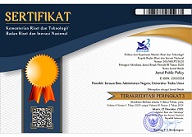Sanitation Management Chain Policy in Tangerang City
Abstract
The increasing population growth in Tangerang City impacts environmental management related to domestic wastewater. This research was conducted because previously, it was found that there were problems in wastewater management in Tangerang City. This study aims to analyze the policies in domestic wastewater management in Tangerang City. The problem of this research is analyzed by public policy theory, based on the content and actor approach of public policy. The method used in this research is qualitative research. The data was obtained from several sources, such as primary and secondary data. The primary data consists of interviews with informants, which a purposive technique has decided. The results of this study explain that the Tangerang City Government applies the SPALD-S and SPALD-T strategies in the sanitation management chain in Tangerang City. The existence of a service function is not optimal because the service orientation needs to try to maximize its function. Then, public access to information is separate from socialization and education programs. This study concludes that the sanitation management provided by the relevant agencies is still faced with several obstacles, such as service orientation that has not been maximized, the lack of public access to information on management services, and the infrastructure of the sanitation management chain, which is considered insufficient.
Keywords
Full Text:
PDFReferences
Agustino, L. (2017). Dasar-Dasar Kebijakan Publik. Alfabeta.
Alfitrah, M., Syariffudin, H., & Nazzarudin. (2018). Strategi Pengelolaan Sanitasi Lingkungan Dalam Penyelenggaraan Pelabuhan Sehat Di Pelabuhan Talang Duku Jambi. Jurnal Pembangunan Berkelanjutan, 1(1), 12. https://online-journal.unja.ac.id/JPB/article/view/5399
Arikunto, S. (2011). Prosedur Penelitian: suatu pendekatan praktik. Rineka Cipta.
Aryantie, M. H., & Hidayat, M. Y. (2019). Regulatory evaluation of waste management institutions in Yogyakarta, Sleman, and Bantul Metropolitan Areas. IOP Conference Series: Earth and Environmental Science, 407(1), 012015. https://doi.org/10.1088/1755-1315/407/1/012015
Ayuningtyas, D. (2014). Kebijakan Kesehatan: Prinsip dan Praktik. Rajawali Pers.
Badan Pusat Statistik. (2021). Jumlah Penduduk Kota Tanggerang. Palembangkota.Bps.Go.Id. http://palembangkota.bps.go.id/
Berbel, J., Gutiérrez-Martín, C., & Martin-Ortega, J. (2017). Water economics and policy. Water (Switzerland), 9(10), 801. https://doi.org/10.3390/w9100801
Dunn, W. (2003). Analisis Kebijakan Publik, Jogjakarta : Gadjah Mada University.
Hamdi, M. M. (2016). metodolgi Penelitian Administrasi. Universitas Terbuka.
Kuzairi, U., Yuswadi, H., Budihardjo, A., & Patriadi, H. B. (2018). The Implementation of Minimum Service Standards (MMS) on Public Service for Health Services Sector in Bondowoso, Indonesia. Otoritas : Jurnal Ilmu Pemerintahan, 8(1), 56. https://doi.org/10.26618/ojip.v8i1.939
Lararenjana, E. (2020). Sanitasi Adalah Upaya Membina Lingkungan Menjadi Lebih Sehat, Pelajari Lebih Lanjut | merdeka.com. Merdeka.Com. https://www.merdeka.com/jatim/sanitasi-adalah-upaya-membina-lingkungan-menjadi-lebih-sehat-pelajari-lebih-lanjut-kln.html
Miolo, M., Kasim, N. M., & Tijow, L. M. (2020). Pengaturan Hukum Tentang Program Penyediaan Air Minum Dan Sanitasi Berbasis Masyarakat (Pamsimas). Gorontalo Law Review, 3(2), 153–167.
Moleong, L. (2010). Metode Penelitian Kualitatif (P. R. Roskadarya (ed.).
Mulasari, S. A., Husodo, A. H., & Muhadjir, N. (2016). Analisis Situasi Permasalahan Sampah Kota Yogyakarta Dan Kebijakan Penanggulangannya. Jurnal Kesehatan Masyarakat, 11(2), 259. https://doi.org/10.15294/kemas.v11i2.3989
Mulyani, R., & Isril. (2021). Implementasi Kebijakan Pembangunan Sistem Pengelolaan Air Limbah Domestik Terpusat Di Kota Pekanbaru Tahun 2019-2020. Jurnal Online Mahasiswa (JOM) Bidang Ilmu Sosial Dan Ilmu Politik, 8(2), 1–13. https://jom.unri.ac.id/index.php/JOMFSIP/article/view/30913
Nazar, F., Mochtar, S., Sufianti, E., Wirjatmitrilestari, E., & Jubaedah, E. (2021). Analisis Implementasi Kebijakan Pengendalian Pembuangan Limbah Cair Domestik Ke Badan Air Penerima Di Kabupaten Purwakarta. Kebijakan: Jurnal Ilmu Administrasi, 12(1). https://doi.org/10.23969/kebijakan.v12i1.3425
Ningrum, P. T. (2013). Gambaran Sanitasi Dasar Pengelolaan Limbah Rumah Tangga di Kecamatan Kaliwates Kabupaten Jember. Jurnal EKESMA, 9(2), 83–96.
Parsons, W. author. (2011). Public policy : pengantar teori praktik analisis kebijakan (pp. 1–686). https://lib.ui.ac.id
Safitri, R., & Maya, M. (2021). Partisipasi Masyarakat dalam Pembangunan Sanitasi Berbasis Masyarakat di Kelurahan Perawang Kecamatan Tualang. Journal of Social and Policy Issues, 122–127.
Sardà, R., O’higgins, T., Cormier, R., Diedrich, A., & Tintoré, J. (2014). A proposed ecosystem-based management system for marine waters: Linking the theory of environmental policy to the practice of environmental management. Ecology and Society, 19(4), art51. https://doi.org/10.5751/ES-07055-190451
Sharma, H. B., Vanapalli, K. R., Cheela, V. S., Ranjan, V. P., Jaglan, A. K., Dubey, B., Goel, S., & Bhattacharya, J. (2020). Challenges, opportunities, and innovations for effective solid waste management during and post COVID-19 pandemic. Resources, Conservation and Recycling, 162. https://doi.org/10.1016/j.resconrec.2020.105052
Siregar, W. M. (2021). Analisis Pelaksanaan Pengelolaan Sampah di Kabupaten Aceh Barat. Journal of Social and Policy Issues, 1. https://journal.pencerah.org/index.php/jspi/article/view/1
Subarsono, A. (2012). Analisis Kebijakan Publik : Konsep Teori Dan Aplikasi. In Pustaka Pelajar (Vol. 2, Issue 9). Yogyakarta: Pustaka Pelajar. Agus Harjito dan Martono, Manajemen Keuangan.
Sugandi, Y. B. W., Paturusi, S. A., & Wiranatha, A. S. (2020). Community-Based Homestay Management in the Village Tourism of Tete Batu, Lombok. E-Journal of Tourism, 369. https://doi.org/10.24922/eot.v7i2.64611
Sugara, A., Dosen, ), & Yuppentek, S. (2017). Implementasi Kebijakan Pengelolaan Kualitas Air Dan Pengendalian Pencemaran Air Kali Sabi Di Kota Tangerang. Jurnal MoZaiK, 9(1), 10–18. https://ijc.ilearning.co/index.php/mozaik/article/view/776
Tanggerang, D. K. K. (2021). Pelayanan air limbah domestik di Kota Tangerang.
Wahab, S. A. (2008). Analisis Kebijakan: Dari Formulasi ke. In Implementasi Kebijakan Negara Edisi Kedua. Jakarta: Bumi Aksara.
Widiastuti, A. (2019). Pengelolaan Sanitasi Lingkungan Dalam Pembangunan Daerah Di Kota Serang. Jurnal Ekonomi-Qu, 9(2). https://doi.org/10.35448/jequ.v2i2.7166
Willetts, J., Mills, F., & Al’Afghani, M. (2020). Sustaining Community-Scale Sanitation Services: Co-management by Local Government and Low-Income Communities in Indonesia. Frontiers in Environmental Science, 8. https://doi.org/10.3389/fenvs.2020.00098
Yazdani, M., Chatterjee, P., Zavadskas, E. K., & Streimikiene, D. (2018). A novel integrated decision-making approach for the evaluation and selection of renewable energy technologies. Clean Technologies and Environmental Policy, 20(2), 403–420. https://doi.org/10.1007/s10098-018-1488-4
Yudo, S., & Said, N. I. (2018). Kebijakan Dan Strategi Pengelolaanair Limbah Domestik Di Indonesia. Jurnal Rekayasa Lingkungan, 10(2). https://doi.org/10.29122/jrl.v10i2.2847
DOI: https://doi.org/10.35308/jpp.v9i1.6144
Refbacks
- There are currently no refbacks.
Copyright (c) 2023 Dafyar Eliadi
p-ISSN: 2477-5738 I e-ISSN: 2502-0528 I DOI: 10.35308
Jl. Alue Peunyareng, Ujong Tanoh Darat, Meureubo, Kabupaten Aceh Barat, Aceh 23681, Indonesia
(0655) 7110535 l +621260313742 l +6285277110911
 is licensed under a Creative Commons Attribution-ShareAlike 4.0 International License
is licensed under a Creative Commons Attribution-ShareAlike 4.0 International License


